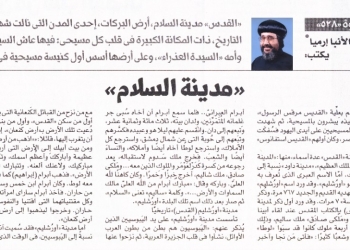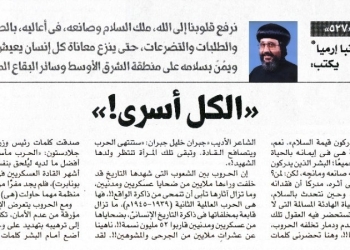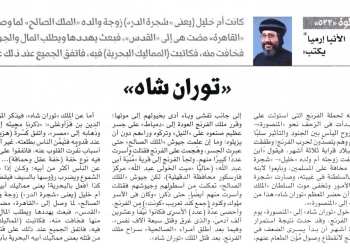In the previous article, we spoke of Pope Mark II, the forty-ninth patriarch, his meeting the proconsul and the love that sprouted in each man’s heart. Likewise, we tackled the Pope’s interest in restoring the demolished churches, the unity with the church of Antioch, and his acceptance of the souls that strayed from Church and how God accepted his prayers: for their head and his father came over in remorse, asking to get back to the Pope’s bosom. We also spoke of the locusts’ attack of Alexandria and Beheira, eating the entire plantation. The Pope was quite saddened. He ordered the congregation to beseech God’s mercy. So, the locusts died.
The Pope was quite kind. At that time, many people used to come to Alexandria dragging prisoners who they sold as slaves. The Pope used to buy as many of them as possible and set them free. It is said that he set free about six thousand people. So, everybody loved him. Yet, Pope Mark underwent lots of tribulations. At that time, the Lakhmids, Madlijs, and Gothamists rebelled against one of the rulers. They wanted to kill him and ransack the city, which led to a fight. Yet, they could not prevail. Coinciding with these incidents, an Andalusian elder arrived at Alexandria. There were lots of Andalusian refugees there. That elder was a mediator between the Andalusians and the Lakhmids. He was to help the Lakhmids kill the ruler, which did take place. Thus, they took the city.
Yet, it came to pass that the friendship between the Lakhmids and Andalusians was changed to animosity. So, the Alexandrians killed the Andalusians wherever they saw them. So much so that eighty Andalusians were killed, which upset the rest. In effect, they rebelled against the Alexandrians, be they Muslims, Christians or Jews. Corpses were so numerous that nobody could bury them. Even worse, it is said that many of them became food for birds and beasts!
When Andalusians arrived at the Savior’s Church which Pope Mark had built and found some of their fellows lying dead nearby, they thought that Christians had killed them. So, they burned the church. Fire spread so fast that it reached a lot of houses and buildings. This broke the Pope’s heart. He used to roam Alexandria, strengthening its people. His news reached the Andalusians. So, they gave him such a hard time that he had to flee to the desert, moving from one city to another lest they would arrest him.
The Pope never stopped praying and beseeching God to alleviate the tribulation. He remained like this for five years. Afterwards, a sage called Maqarah bin Sath, of Nabrouh, went to the ruler of the eastern province. He told him of what the Andalusians did, that they robbed money from the churches and burned them, and that the Pope was moving from one place to another lest they would arrest him. The sage asked the ruler to write a letter to the Pope to reassure him. He also asked the ruler’s permission to host the Pope in his house, which the ruler approved of.
No sooner had the sage sent the letter to the Pope, than the latter came to Nabrouh and stayed there. Yet, he continued taking care of the churches of Alexandria, the patriarchal residence and St. Mina’s Church in Marriott.
It then came to pass that Kyriako, the patriarch of Antioch departed. He was succeeded by patriarch Dionysus who sent a message to the Pope, telling him that some dissidents had repented and come back to Church. Pope Mark rejoiced. He wrote a message to the patriarch expressing his joy for the return of the dissidents and asking him to pray for the incidents that had taken place in Alexandria. Yet, it was not long before Naturn desert was raided and ransacked. Its churches and cells were demolished. Many monks were killed or imprisoned. Thus, the desert became a wasteland, which added to the Pope’s sadness. Yet, he endured patiently, beseeching God to relieve him from his pains. Eventually, he departed on Easter Eve in 819 A.D. after the end of the Mass. His last words to the congregation were, “May God be with you.”
We mentioned beforehand that Harun al-Rashid died during Pope Mark II’s tenure. He had already made his son Mohammed al-Amin heir apparent, despite the fact al-Ma’mun was older, for he was born six months before al-Amin. When al-Rashid died, al-Amin was in Baghdad. His brother Saleh brought him the cloak and sword. So, he returned to the caliphate palace where the people pledged allegiance to him. Likewise, al-Ma’mun sent him presents and pledged allegiance to him. So did al-Qasim. Thus, al-Amin became the sixth Abbasid caliph.
Mohammed al-Amin (193-198 Hijri) (809-813 A.D.)
As we mentioned earlier, al-Rashid had assigned al-Amin’s mentorship to al-Fadl bin Yahya, the Barmakid. On the other hand, Ja’far bin Yahya was assigned the mentorship of al-Ma’mun. This mentorship was more fruitful with al-Ma’mun than al-Amin. He was wise, meticulous, farsighted, and religious. Al-Rashid realized that difference. So, he assigned the East to al-Ma’mun.
Historians have no common opinion regarding al-Ma’mun. Some maintain that he lacked in political experience and insight, was negligent, and extravagant. One of his contemporaries, Sa’id bin Humayd, said, “When al-Amin became caliph, he summoned entertainers from everywhere. He made them a page of his. He competed in buying the best breeds of horse, bird, and beast. Moreover, he avoided his brothers, commanders, and family. He scorned them, dividing his money and jewelry amongst his eunuchs and entertainers.
Al-Amin ordered that all the money and weapons in al-Raqqah be brought over to him. Likewise, he ordered that relaxation and entertainment places be built in the palaces of al-Khuld, al-Khayzuraniah, Bustan Mussa, and others. Moreover, he spent a lot of money on building five warships that have the shapes of the lion, elephant, eagle, serpent, and horse.”
Al-Amin’s poet, al-Hussein bin al-Dahhak, said, “Al-Amin had a great ship built. He spent three thousand dirhams on that purpose. He had another built, in the shape of a sea creature called ‘dolphin”. Al-Mas’udi described him as follows, “Al-Amin was a spendthrift. He had a bad reputation. He was a capricious blood-shedder, who neglected his affairs, relying on others in important matters and trusting whoever did not advise him.” Even worse, he would depend on dreams in making important decisions! Unlike him, al-Ma’mun used to seek his faithful men’s advice. Al-Amin was also… Here is another story. Stories never end in Beautiful Egypt.
General Bishop
Head of the Coptic Orthodox Cultural Center









